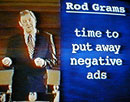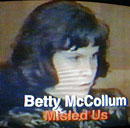Attack of the Attack Ads
By Laura McCallum
October 5, 2000
Part of Campaign 2000's Ad Watch series
With about a month to go until the November election, a series of new attack ads are airing in Minnesota. Republican Senator Rod Grams is out with a second ad challenging the credibility of his DFL opponent, Mark Dayton, while Dayton is firing back with an ad criticizing the Grams' spots. The negative tone is not limited to the Senate race; Republican 4th Congressional District candidate Linda Runbeck is running an ad attacking her DFL opponent, Betty McCollum.
The first Grams attack ad, which came out right after the primary, was dubbed the single-most-distorted ad of campaign 2000 in Minnesota by analyst Dean Alger, the Minnesota director of the Alliance for Better Campaigns. Grams' second attack ad uses some of the same elements - grainy, black and white, slowed-down video of Dayton, which makes him look shifty, and a repeat of the charge that Dayton profited from the very prescription drug companies he's criticized. It also includes a new charge.
Grams supports allowing workers to invest most of their Social Security taxes in private retirement accounts. Grams has yet to run a single ad touting his policy positions, and Alger believes this ad - like his previous one - may backfire.
"It is startling because it's talking about prescription drugs, about which seniors are the greatest concern, and the second thing it talks about is the Social Security system, which is also a senior issue, and yet seniors - research shows - have the least tolerance for harsh attack ads," Alger says.
The Dayton campaign is using the Grams' attacks as fodder for its latest ad.
"I have criticized the Grams RNC ads for distorted visuals. Sadly, the Dayton ad includes distorted visuals of Grams. That is, they have slowed down the tape, and makes Grams look a little weird," says Alger.
The campaign advertising code adopted by the Minnesota Compact election-reform effort calls on candidates not to distort their opponents' images in commercials.
Alger says Republican 4th District candidate, Linda Runbeck, also violates the code in her first television ad, which uses unflattering, slow-motion video of DFL State Representative Betty McCollum, while criticizing her for a Twins stadium vote.
"This was certainly not a direct vote, saying 'We'll spend money for the stadium, rather than on environmental issues,' and indeed, McCollum has gotten the support of environmental groups on the whole. It also says 'used tax dollars,' that's definitely misleading, because, in fact, the bill that she voted for would have used revenue bonds, not tax money to build the stadium."
Alger says it's surprising that Runbeck has chosen a sharp attack for her first ad. Candidates usually begin by introducing themselves to voters. Runbeck's campaign says Democrats brought on the attack by sending out a stadium attack on McCollum's DFL primary opponents days before the election. McCollum has denied knowing the state DFL party was preparing the attack, but once it was out, said she had no qualms about its content.
The only candidates currently on television who haven't gone negative are 6th District DFL Congressman Bill Luther (Listen) and his Republican opponent, John Kline (Listen). Both are running warm, fuzzy spots. The Luther ad shows old photos of his parents' farm and him as a child.
By Laura McCallum
October 5, 2000
Part of Campaign 2000's Ad Watch series
|
|
RealAudio 3.0 |
With about a month to go until the November election, a series of new attack ads are airing in Minnesota. Republican Senator Rod Grams is out with a second ad challenging the credibility of his DFL opponent, Mark Dayton, while Dayton is firing back with an ad criticizing the Grams' spots. The negative tone is not limited to the Senate race; Republican 4th Congressional District candidate Linda Runbeck is running an ad attacking her DFL opponent, Betty McCollum.
| |
|
|
|
||
The first Grams attack ad, which came out right after the primary, was dubbed the single-most-distorted ad of campaign 2000 in Minnesota by analyst Dean Alger, the Minnesota director of the Alliance for Better Campaigns. Grams' second attack ad uses some of the same elements - grainy, black and white, slowed-down video of Dayton, which makes him look shifty, and a repeat of the charge that Dayton profited from the very prescription drug companies he's criticized. It also includes a new charge.
Ad: Now, Dayton says, you shouldn't be allowed to invest some of your own Social Security money. Even though, as state auditor, he oversaw retirement plans for government workers that profited from the same kind of investments. The truth is: Mark Dayton will do or say or buy anything to win this election.Analyst Alger says the investment claim has an element of truth in it. As auditor, Dayton served on the state Board of Investments, which oversaw state employee pension plans. But Dayton argues that Social Security is the one retirement plan that should be absolutely secure and free from the volatility of private markets.
Grams supports allowing workers to invest most of their Social Security taxes in private retirement accounts. Grams has yet to run a single ad touting his policy positions, and Alger believes this ad - like his previous one - may backfire.
"It is startling because it's talking about prescription drugs, about which seniors are the greatest concern, and the second thing it talks about is the Social Security system, which is also a senior issue, and yet seniors - research shows - have the least tolerance for harsh attack ads," Alger says.
| |
|
|
|
||
The Dayton campaign is using the Grams' attacks as fodder for its latest ad.
Ad: In 1994, Rod Grams wrote, We have had enough of negative campaigns in Minnesota. But today, Grams is desperate, so he's unleashed a negative campaign against Mark Dayton.Alger says the ad refers to Grams' first Senate bid, when opponent Ann Wynia went negative in the final days. Alger says while it's legitimate to remind the public of Grams' proclamation, Dayton hypocritically uses a classic negative ad technique.
"I have criticized the Grams RNC ads for distorted visuals. Sadly, the Dayton ad includes distorted visuals of Grams. That is, they have slowed down the tape, and makes Grams look a little weird," says Alger.
The campaign advertising code adopted by the Minnesota Compact election-reform effort calls on candidates not to distort their opponents' images in commercials.
Alger says Republican 4th District candidate, Linda Runbeck, also violates the code in her first television ad, which uses unflattering, slow-motion video of DFL State Representative Betty McCollum, while criticizing her for a Twins stadium vote.
Ad: Betty McCollum voted to use our tax dollars for sports stadiums, taking money away from our environment and away from our children. Then for the sake of politics, she ran from her vote and hoped we wouldn't find out. We think that says a lot about her priorities.Alger says the ad misrepresents McCollum's vote.
| |
|
|
|
||
"This was certainly not a direct vote, saying 'We'll spend money for the stadium, rather than on environmental issues,' and indeed, McCollum has gotten the support of environmental groups on the whole. It also says 'used tax dollars,' that's definitely misleading, because, in fact, the bill that she voted for would have used revenue bonds, not tax money to build the stadium."
Alger says it's surprising that Runbeck has chosen a sharp attack for her first ad. Candidates usually begin by introducing themselves to voters. Runbeck's campaign says Democrats brought on the attack by sending out a stadium attack on McCollum's DFL primary opponents days before the election. McCollum has denied knowing the state DFL party was preparing the attack, but once it was out, said she had no qualms about its content.
The only candidates currently on television who haven't gone negative are 6th District DFL Congressman Bill Luther (Listen) and his Republican opponent, John Kline (Listen). Both are running warm, fuzzy spots. The Luther ad shows old photos of his parents' farm and him as a child.
Ad: On the farm, my parents taught me that you don't run up credit. You pay your bills as they come due."The Kline ad features colorful images of Kline talking to seniors and children. It also includes black-and-white photos of Kline with former Presidents Reagan and Carter, as the Marine Corps officer entrusted with safeguarding the so-called "football" containing nuclear-launch codes.
Ad: America trusted him with the safety of the world. Minnesota can count on him in Congress.Alger calls that the most wildly-inflated claim of campaign 2000. Both Kline and Luther make the same promise in their ads - that they're committed to using the surplus to save Social Security and pay down the national debt. But Alger says both candidates lack specifics, and need to tell voters the details. He says he's disappointed that, so far, the ads that have dominated the general election campaign have been harsh attacks, which voters have repeatedly said they're sick of seeing.



